- Home
- Muriel Spark
The Only Problem Page 4
The Only Problem Read online
Page 4
It was three weeks after she had arrived that Ruth said, ‘I’m going to write to Edward.’
‘I have written,’ said Harvey.
‘I know,’ she said, and he wondered how she knew, since he had posted the letter himself. ‘But I’ll write myself. I couldn’t be the wife of an actor again.
‘If he was a famous actor?’
‘Well, he isn’t a famous actor. A part here, a part there, and sometimes a film. So full of himself when he has a part. It was a much better life for me when he was a curate.’
But she had no nostalgia even for those days of church fêtes, evening lectures and sewing classes. She already had a grip of her new life, dominated as it was by the Book of Job.
‘You feel safer when you’re living with someone who’s in the God-business,’ Harvey said. ‘More at home.’
‘Perhaps that’s it,’ she said.
‘And a steadier income.’
‘Such as it is,’ she said, for she asked little for herself. ‘But,’ she said, ‘I was bored. He always agreed with me, and you don’t.’
‘That’s because you’re one of my comforters,’ Harvey said. ‘Job had his comforters to contend with; why shouldn’t I?’
‘Do you think of yourself as Job?’
‘Not exactly, but one can’t help sympathising with the man.’
‘I don’t know about that,’ said Ruth. ‘Job was a very rich man. He lost all his goods, and all his sons and daughters, and took it all very philosophically. He said, “The Lord gave, the Lord taketh away, blessed be the name of the Lord.” Then he gets covered with boils; and it’s only then that his nerve gives way, he’s touched personally. He starts his complaint against God at that point only. No question of why his sons should have lost their lives, no enquiries of God about the cause of their fate. It’s his skin disease that sets him off.’
‘Maybe it was shingles,’ Harvey said. ‘A nervous disease. Anyway, it got on his nerves.
Ruth said, ‘He had to be touched himself before he would react. Touched in his own body. Utterly selfish. He doesn’t seem to have suffered much or he wouldn’t have been able to go into all that long argument. He couldn’t have had a temperature.’
‘I don’t agree. I think he had a high temperature all through the argument,’ Harvey said. ‘Because it’s high poetry. Or else, maybe you’re right; maybe it was the author who had the temperature. Job himself just sat there with a long face arguing against the theories of his friends.’
‘Make a note of that,’ Ruth commanded.
‘I’ll make a note.’ He did so.
‘Someone must have fed him,’ said Ruth. ‘Someone must have brought him meals to eat as he sat on the dung—hill outside the town.’
‘I’m not sure he sat on a dung-hill outside the town. That is an assumption based on an unverified Greek version of the text. He is merely said to have sat in the ashes on the ground. Presumably at his own hearth. And his good wife, no doubt, brought him his meals.’
Ruth had proved to be an excellent cook, cramped in the kitchen with that weird three-tiered kerosene stove of hers.
‘What do you mean, “his good wife”?’ Ruth said. ‘She told him, “Curse God and die.”‘
‘That was a way of expressing her exasperation. She was tired of his griping and she merely wanted him to get it off his chest quickly, and finish.’
‘I suppose the wife suffered,’ said Ruth. ‘But whoever wrote the book made nothing of her. Job deserved all he got.’
‘That was the point that his three friends tried to get across to him,’ Harvey said. ‘But Job made the point that he didn’t deserve it. Suffering isn’t in proportion to what the sufferer deserves.’
Ruth wrote in September:
Dear Edward,
I suppose you have gathered by now that I’ve changed my mind about Harvey. I don’t know what he’s written to you.
He really is a most interesting man. I believe I can help Harvey. I can’t return to face the life we had together, ever again. My dear, I don’t know how I could have thought I would. My plan was, as you know, entirely different. I feel Harvey needs me. I am playing a role in his life. He is serious. Don’t imagine I’m living in luxury. He never mentions his wealth. But of course I am aware that if there is anything I require for myself or Clara, I can have it.
You may have heard from Ernie Howe that he is coming to visit Clara. She’s well and pretty, and full of life.
I’m sure you have heard from Harvey how things are between him and me. It’s too soon to talk of the future.
This has been a difficult letter to write. I know that you’ll agree with what I say. You always do.
Ruth
She gave Harvey the letter to read, watching him while he read it. He looked younger than Edward, probably because of Edward’s beard, although he was a little older. Harvey was lean and dark, tall, stringy.
‘It’s a bit dry,’ Harvey said.
‘It’s all I can do. Edward knows what I’m like.’
‘I suppose,’ said Harvey, ‘he’ll be hurt.’ ‘He doesn’t love me,’ Ruth said.
‘How do you know?’
‘How does one know?’
‘Still, he won’t want to lose his property.’
‘That’s something else.’
Now, in October, Ruth was talking about sending to England for cretonne fabric. ‘One can’t get exactly what I want in France,’ she said.
Harvey wrote:
Dear Edward,
Thanks for yours.
The infant is cutting a tooth and makes a din at night. Ruth has very disturbed nights. So do I. It’s been raining steadily for three days. Ernie Howe came. We had a chat. He seems to feel fraternal towards me because we both had to do with Effie. He wants to talk about Effie. I don’t. Afterwards, in the place next door that Ruth has fixed up for herself and Clara, Ernie asked her if she would go home and live with him and bring the baby. Ruth said no. I think he’s after Ruth because she reminds him of Effie. He said he wouldn’t take the child away from Ruth if she doesn’t want to part with it, which she doesn’t.
I’m sorry to hear that you don’t miss Ruth. You ought to.
Cheque enclosed. I know you’re not ‘selling your wife’. Why should I think you are? You took money before I was sleeping with Ruth, so where’s the difference?
I don’t agree the comforters just came to gloat. They relieved Job’s suffering by arguing with him, keeping him talking. In different ways they keep insinuating that Job ‘deserved’ his misfortunes; he must have done something wrong. While Job insists that he hasn’t, that the massed calamities that came on him haven’t any relation to his own actions. He upsets all their theology. Those three friends of his are very patient and considerate, given their historical position. But Job is having a nervous crisis. He can’t sleep. See 7, 13—16.
When I say, My bed shall
comfort me, my couch shall ease
my complaint;
Then thou scarest me with
dreams, and terrifiest me through
visions:
So that my soul chooseth
strangling, and death rather than
my life.
I loathe it; I would not
live alway: let me alone …
So I say, at least the three comforters kept him company. And they took turns as analyst. Job was like the patient on the couch.
Ruth doesn’t sympathise with Job. She sees the male pig in him. That’s a point of view.
The baby has started to squawk. I don’t know what I’m going to do about the noise.
Yours,
Harvey
Ruth came in, jogging in her arms the baby Clara who had a whole fist in her mouth and who made noises of half-laughing, half-crying. Soon, she would start to bawl. Ruth’s hair fell over her face, no longer like that of a curate’s wife.
‘Did you know that they want to sell the château?’ she said.
The château was half a mile
up the grassy pathway which led away from the cottage. Harvey knew the owner and had seen the house; that was when he first rented the cottage. He knew it was up for sale, and had been for some years.
‘It’s falling to bits,’ he said to Ruth.
‘What a pity to neglect it like that!’ Ruth said. ‘It’s a charming house. It reminds me of something from my childhood, I don’t know quite what. Perhaps somewhere we visited. I think something could be done to it.’
She brought the fretful child close to Harvey so that he could make an ugly face. He showed his teeth and growled, whereupon Clara temporarily forgot her woes. She smelt of sour milk.
FOUR
Up at the château where the neglected lawns were greener than the patch round Harvey’s house, and where the shrubberies were thick and very dark evergreen, the workmen were putting in the daylight hours of the last few days before the Christmas holidays. She had already reclaimed one wing for habitation. The roof had been secured in that part, but most of the rooms were cold. Ruth had arranged one sitting room, however, with a fire, and two bedrooms with oil stoves. A good start.
What a business it had been to persuade Harvey to buy the château! And now he was enchanted. Once he agreed to buy — and that was the uphill work — it was simple. Harvey sent for his London lawyer, Stewart Cowper, and for his French lawyer, Martin Deschamps, to meet in Nancy and discuss the deal with the family who owned the château. Ruth had gone with Harvey to this meeting, in October, with Clara in her folding pram. When the hotel room got too boring for the baby, Ruth hushed her, put her in her pram and took her for a walk in Place Stanislas. It was not long before Ruth saw through the splendid gilt gates the whole business group, with Harvey, trooping out to take the sun and continue the deal in the glittering square. Harvey, his two lawyers, and the three members of the de Remiremont family, which comprised a middle-aged man, his daughter and his nephew, came and joined Ruth. The daughter put her hand on the handle of the pram. They all ambled round in a very unprofessional way, talking of notaries and tax and the laws governing foreigners’ property in France. You could see that this was only a preliminary.
Harvey said, ‘We have to leave you. I’m writing a book on the Book of Job.’
It was difficult to get across to them what the Book of Job was. Harvey’s French wasn’t at fault, it was their knowledge of the Bible of which, like most good Catholics, they had scant knowledge. They stood around, the father in his old tweed coat and trousers, the daughter and nephew in their woollen jumpers and blue jeans, puzzling out what was Job. Finally, the father remembered. It all came back to him. ‘You shouldn’t be in a hurry, then,’ he said. ‘Job had patience, isn’t that right? One says, “the patience of Job”.’
‘In fact,’ said Harvey, ‘Job was the most impatient of men.’
‘Well, it’s good to know what it is you’re writing in that wretched little cottage,’ said the elder man. ‘I often wondered.’
‘I hope we’ll soon have the house,’ said Ruth.
‘So do we,’ said the owner. ‘We’ll be glad to get rid of it.’ The young man and the girl laughed. The lawyers looked a little worried about the frankness and the freedom, suspecting, no doubt, some façade covering a cunning intention.
Ruth and Harvey left them then. It was all settled within a month except for the final bureaucracy, which might drag on for years. Anyhow, Harvey had paid, and Ruth was free to order her workmen to move in.
‘Instead of disabusing myself of worldly goods in order to enter the spirit of Job I seem to acquire more, ever more and more,’ was all that Harvey said.
Ruth wrote to Effie with her letter-pad on her knee, beside the only fireplace, while the workmen hammered away, a few days before Christmas.
Dear Effie,
I really am in love with Harvey and you have no reason to say I am not. The lovely way he bought the house — so casual — we just walked round the Place with Clara and the family who used to own the château — and Harvey shook hands and that was all. The lawyers are working it out, but the house is ours.
I can’t make out your letter. You don’t want Clara, at least not the bother of her. You despise Harvey. What do you mean, that I have stolen your husband and your child? Be civilised.
Ruth stopped, read what she had written, and tore it up. Why should I reply to Effie? What do I owe her? She stole a bit of chocolate, on principle. I stole her husband, not on principle. As for her child, I haven’t stolen her, she has abandoned her baby. All right, Effie is young and beautiful, and now has to work for her living. Possibly she’s broke.
Dear Effie,
What attracted me most about the château was the woodpecker in the tree outside the bedroom window. Why don’t you come and visit Clara?
Love,
Ruth
She sealed it up and put it on the big plate in the hall to be posted, for all the world as if the château was already a going concern. The big plate on a table by the door was all there was in the huge dusty hall, but it was a beginning.
Now she took sleeping Clara in her carry-cot and set her beside the driver’s seat in the car. She put a basket in the back containing bread, pâté, a roast bantam hen and a bottle of Côte du Rhône, and she set off down the drive to Harvey’s house for lunch. The tired patch of withered shrubbery round Harvey’s cottage was still noticeably different from the rest of the château’s foliage, although Ruth had dug around a few bushes to improve them, and planted some bulbs. As soon as she pushed open the door she saw he had a visitor. She dumped the food basket and went back for the baby, having glimpsed the outline of a student, a young man, any student, with those blue jeans of such a tight fit, they were reminiscent of Elizabethan women’s breasts, in that you wondered, looking at their portraits, where they put their natural flesh. The student followed her out to the car. It was Nathan. ‘Nathan! It’s you, — you here. I didn’t recognise …’ He woke Clara with his big kiss, and the child wailed. He picked her up and pranced up and down with the wakened child. Harvey’s studious cottage was a carnival. Harvey said to Ruth, ‘I’ve told Nathan there will be room for him up at the house.’
Nathan had brought some food, too. He had been skilful as ever in finding the glasses, the plates; everything was set for lunch. Ruth got Clara back to sleep again, but precariously, clutching a ragged crust.
Harvey said very little. He had closed the notebook he was working on, and unnaturally tidied his papers; his pens were arranged neatly, and everything on his writing-table looked put-away. He sat looking at the floor between his feet.
Nathan announced, ‘I just had to come. I had nothing else to do. It’s a long time since I had a holiday.’
‘And Edward, how’s Edward?’ Ruth said.
‘Don’t you hear from Edward?’
‘Yes of course,’ said Ruth, and Harvey said the same.
Nathan opened his big travel pack and brought out yet more food purchases that he had picked up on the way: cheese, wine, pâté and a bottle of Framboise. He left the pack open while he took them to the table. Inside was a muddle of clothes and spare shoes, but Harvey noticed the edges of Christmas-wrapped parcels sticking up from the bottom of the pack. My God, he has come for Christmas. Harvey looked at Ruth: did she invite him? Ruth fluttered about with her thanks and her chatter.
‘Are you off to Paris for Christmas?’ Harvey enquired. This was his first meeting with Nathan since the holiday in Italy when Harvey had abandoned his party on the autostrada; he felt he could be distant and impersonal without offence.
‘I’ve come mainly to visit Clara for Christmas,’ said Nathan. He was lifting the baby out of the carry-cot.
‘Let her sleep,’ Harvey said.
‘Oh, Nathan must stay over Christmas,’ Ruth said. ‘Paris will be crowded. And dreadfully expensive.’ She added, ‘Nathan is a marvellous cook.’
‘So I have heard.’
Ruth didn’t notice, or affected not to notice, a look of empty desperation on Harvey’s
face; a pallor, a cornered look; his lips were parted, his eyes were focusing only on some anguished thought. And he was, in fact, suddenly aghast: What am I doing with these people around me? Who asked this fool to come and join us for Christmas? What do I need with Christmas, and Ruth, and a baby and a bloody little youth who needs a holiday? Why did I buy that château if not for Ruth and the baby to get out of my way? He looked at his writing-table, and panicked.
‘I’m going out, I’ll just fetch my coat,’ he said, thumping upstairs two at a time.
‘Harvey, what’s the matter?’ said Ruth when he appeared again with his sheepskin jacket, his woollen hat. Rain had started to splash down with foul eagerness.
‘Don’t you want lunch?’ she said.
‘Excuse me. I’m studious,’ said Harvey, as he left the cottage. The car door slammed. The starter wouldn’t work at first try. The sound of Harvey working and working at the starter became ever more furious until finally he was off.
When he came back in the evening the little house was deserted, all cleaned up. He poured himself a whisky, sat down and started to think of Effie. She was different from Ruth, almost a race apart. Ruth was kind, or comparatively so. Effie wasn’t comparatively anything, certainly not kind. She was absolutely fascinating. Harvey remembered Effie at parties, her beauty, part of which was a quick-witted merriment. How could two sisters be so physically alike and yet so totally different? At any moment Ruth might come in and reproach him for not having the Christmas spirit. Effie would never do that. Ruth was thoroughly bourgeois by nature; Effie, anarchistic, aristocratic. I miss Effie, I miss her a lot, Harvey told himself. The sound of Ruth’s little car coming down the drive, slowly in the mist, chimed with his thought as would the stroke of eight if there was a clock in the room. He looked at his watch, eight o’clock precisely. She had come to fetch him for dinner; three dinner-places set out on the table of the elegant room in the château, and the baby swinging in a hammock set up in a corner.

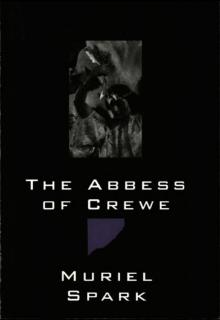 The Abbess of Crewe: A Modern Morality Tale
The Abbess of Crewe: A Modern Morality Tale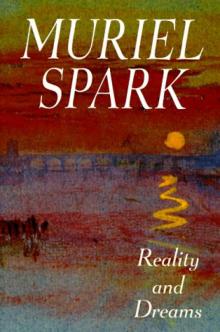 Reality and Dreams
Reality and Dreams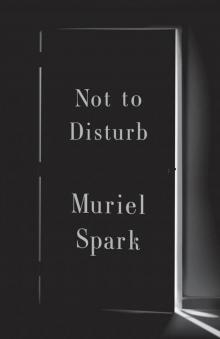 Not to Disturb
Not to Disturb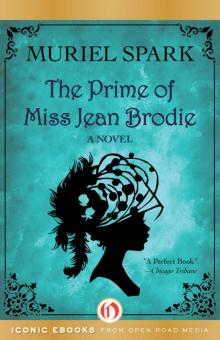 The Prime of Miss Jean Brodie
The Prime of Miss Jean Brodie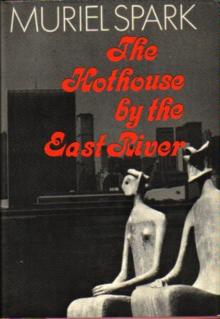 The Hothouse by the East River
The Hothouse by the East River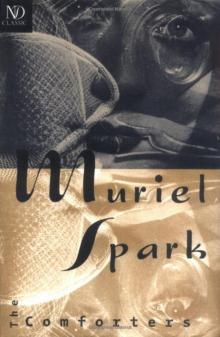 The Comforters
The Comforters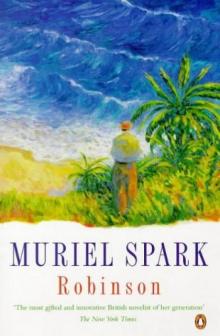 (1958) Robinson
(1958) Robinson Unknown
Unknown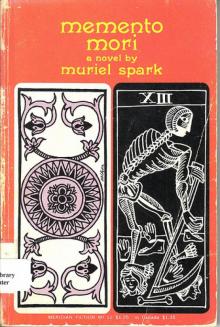 Memento Mori
Memento Mori The Finishing School
The Finishing School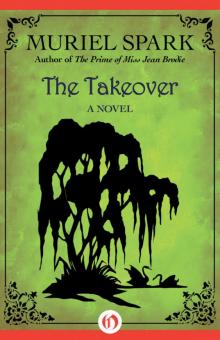 The Takeover
The Takeover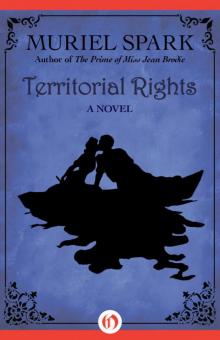 Territorial Rights
Territorial Rights The Complete Short Stories
The Complete Short Stories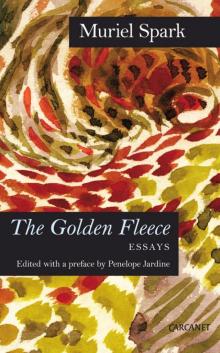 The Golden Fleece: Essays
The Golden Fleece: Essays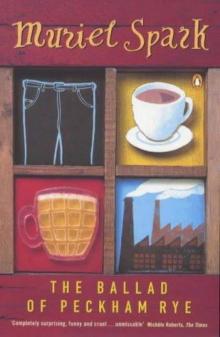 The Ballad of Peckham Rye
The Ballad of Peckham Rye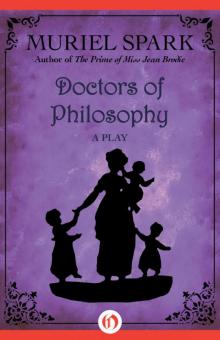 Doctors of Philosophy: A Play
Doctors of Philosophy: A Play The Mandelbaum Gate
The Mandelbaum Gate Loitering With Intent
Loitering With Intent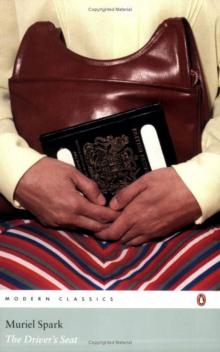 The Driver's Seat
The Driver's Seat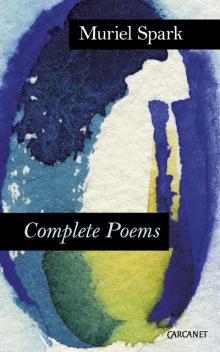 Complete Poems: Muriel Spark
Complete Poems: Muriel Spark Symposium
Symposium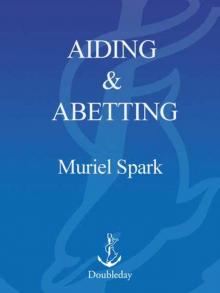 Aiding and Abetting
Aiding and Abetting The Golden Fleece
The Golden Fleece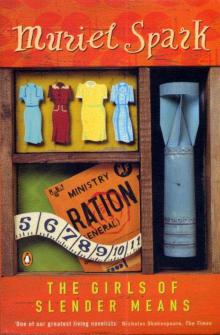 The Girls of Slender Means
The Girls of Slender Means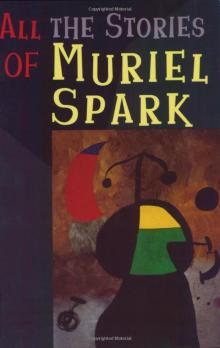 Alice Long’s Dachshunds
Alice Long’s Dachshunds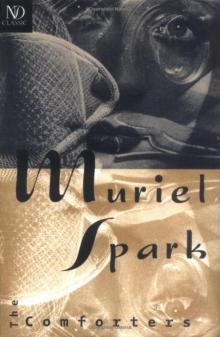 (1954) The Comforters
(1954) The Comforters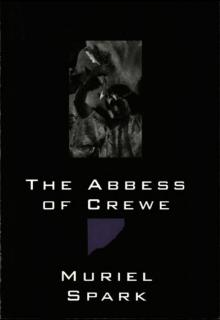 The Abbess of Crewe
The Abbess of Crewe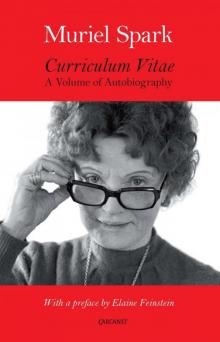 Curriculum Vitae
Curriculum Vitae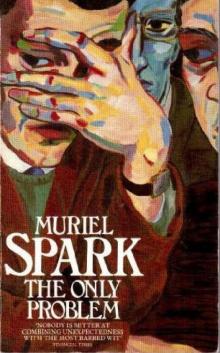 The Only Problem
The Only Problem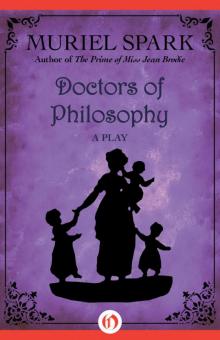 Doctors of Philosophy
Doctors of Philosophy